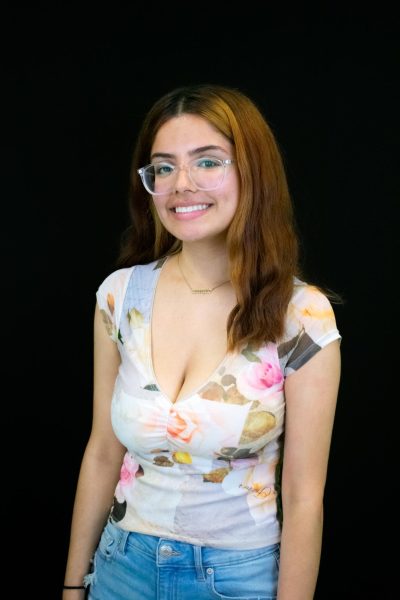When Lia Gil, a sophomore acting major from the Dominican Republic, first moved to Chicago to study at Columbia, she felt out of place.
“Before moving here, it’s like you don’t know what home is — in the way fish don’t know they’re in water because they can’t see it. But when you’re suddenly out of it, you can see the water. That’s how I felt; I started realizing I didn’t belong,” Gil recalled of her first year.
Her sense of isolation shifted when she enrolled in “Chicago Film History,” a Columbia Big Chicago course during her first semester in 2023. Through the course, taught by associate professor Jeffrey Spitz in the School of Film and Television, Gil not only learned about the city’s rich cinematic past but also made connections that would lead her to new opportunities, expanding her vision of what her career could become.
For her final project, Gil was tasked with creating a video about a significant historical site in Chicago. Initially drawn to the Art Institute of Chicago, she sought guidance from her professor, Spitz, whose suggestions helped her explore a new perspective of the city — one that resonated with her growing interests and ambitions.
In a class of more than 100 students, Spitz said Gil stood out. She regularly sat in the first five rows, fully engaged in the lectures while many others scrolled through their phones. Though she was quiet at first, she gradually opened up — asking thoughtful questions, including one about historical sites where Spanish is spoken, Spitz said.
“The growth that I saw was somebody stepping out from a crowd of faces in a theater where I’m supposed to engage students and give them, as best I can, a sense of belonging to Chicago and to Columbia College,” Spitz said.
The assignment led Gil to discover the International Latino Cultural Center, which organizes the Chicago Latino Film Festival and hosts events at Instituto Cervantes. Although Gil had not scheduled an appointment, the organization and its executive director, Columbia alum Pepe Vargas, warmly welcomed her and shared their mission.
She recalled becoming emotional and feeling relief upon finding a place where she was understood without having to explain herself.
“It feels like home, and they’re just like my family, far from home,” Gil said.
Through this connection, Gil has flourished professionally. She served as a host at the 41st film festival this year, presenting at the opening night and kickoff party, participating in live broadcasts, appearing in promotional films and interviewing key figures.
Vargas recognized Gil as a valuable addition to the festival.
“Because of her talent, charisma and willingness to help us, I asked her to co-host two live streaming shows that we had for the 41st Chicago Latino Film Festival — she was brilliant,” Vargas said.
As a Dominican student adapting to life in Chicago, Gil’s involvement with the Latino Cultural Center evolved beyond personal connection into meaningful cultural bridge-building, a path she had not anticipated at the start of the class. She said that while the industry often focuses on Hollywood, her time at Columbia opened her eyes to the power of shared values and the ability to unite diverse cultures to create something inclusive and representative.
“I feel like moving into a different country where there’s a different culture, it can be very scary for some people and it is and was for me,” Gil said. “The challenge to me is just like keep doing what I’m doing no matter if I feel insecure or scared because otherwise I won’t do anything.”
One fellow student, Lia Castro, a senior fashion studies major who has collaborated with Gil in a dance project, said it is important for international students to feel a part of the community.
“Knowing that international students are far away from home, it can be very isolating. And I just think that it’s like our duty to help them out and make sure that they feel supported at Columbia,” Castro said.
Despite fears, Gil’s efforts to promote Latino cinema and create spaces for diverse voices is something that Spitz sees as essential for cross-cultural understanding during times of social change.
“We’re going through an incredibly stressful and frightening time of people feeling isolated and biased and also scared that the democracy we’ve built all of our institutions on is crumbling. I think it’s incredibly important that we learn from young people about their wishes and we find out whether they are willing to take that step,” said Spitz.
Copy edited by Trinity Balboa
Resumen en Español:
Cuando Lia Gil, una estudiante de segundo año de actuación de la República Dominicana, se mudó a Chicago para estudiar en Columbia, se sintió como un pez fuera del agua.
“Antes de mudarme aquí, es como si no supieras lo que es el hogar, como si los peces no se dieran cuenta de que están en el agua. Pero cuando estás repentinamente fuera de eso, puedes verlo. Así me sentí; empecé a darme cuenta de que no pertenecía”, dijo Gil.
Sus sentimientos de aislamiento cambiaron cuando se inscribió en un curso de “Big Chicago”, específicamente “Chicago Film History”, con el profesor asociado Jeff Spitz en la Escuela de Cine y Televisión, durante su primer semestre en 2023.
A través del curso, Gil no solo aprendió sobre la larga historia cinematográfica de la ciudad, sino que también hizo conexiones que la llevarían a nuevas oportunidades, ampliando su visión de lo que podría llegar a ser su carrera.
El encargo llevó a Gil a descubrir el Centro Cultural Latino Internacional, que organiza el Festival de Cine Latino de Chicago y alberga eventos en el Instituto Cervantes. Aunque Gil no había programado una cita, la organización y su director ejecutivo, el alumno de Columbia, Pepe Vargas, le dieron una cálida bienvenida y compartieron su misión.
Resumen por Araceli Ramirez
Resumen editado por Doreen Abril Albuerne Rodriguez











